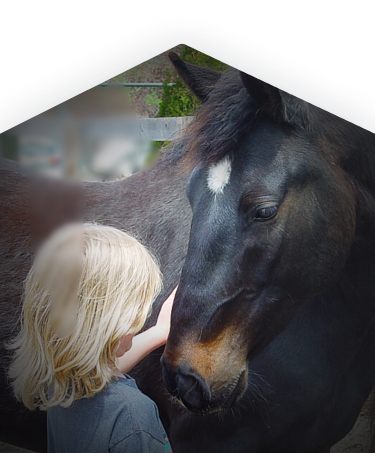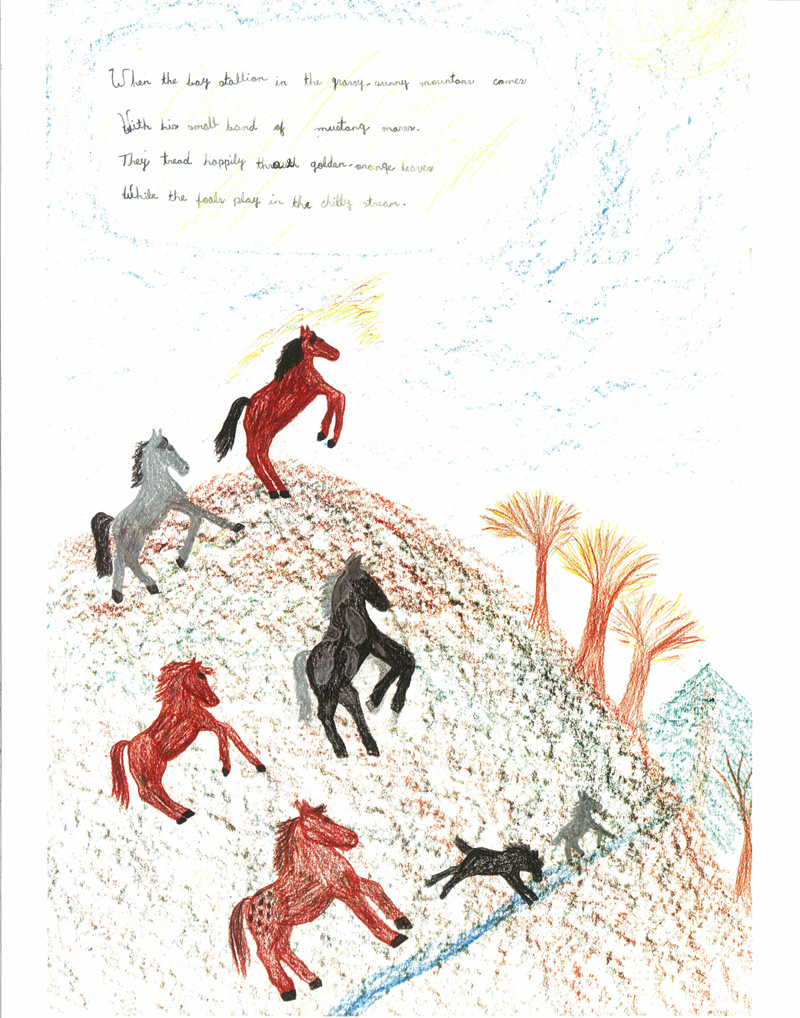How We Began
The Kaeli Kramer Foundation’s horse rescue work began in August 2009. Kaeli loved all horses and had a special place in her heart for the wild ones. When she was twelve, she took a trip out West where she rode horseback through the Nevada mountains to see the wild mustangs living free on the open range. She was awed by their beauty but brokenhearted to learn they were being forced to leave their natural homes.
It seemed like a sign when we heard that there would be a mustang auction in Ithaca, New York. There were about fifty-five horses for adoption ranging in age from less than a year to five years of age-all beautiful animals in their prime looking for forever homes.
Of course we wanted to rescue them all. In the end, we chose two young horses-a reserved colt and a clever, shy filly. Callie and Valor are now Mustang ambassadors at the Kaeli Kramer Humane Education Center in Holtsville, New York where they teach children and adults about the plight of these magnificent animals who are a living part of American history.
Valor tells his story:
My mother roamed freely in the secluded timbered woods of Oregon. This area is known for its hot, dry summers and cold winters that reach below zero. The horses that live among ponderosa pines are known as “timber horses.” We are said to have descended from the horses of the early Spanish settlers. My mother lived in a small family band with her stallion and a few other mares and their babies.
Life was rough for me. My pregnant mother was captured by the Bureau of Land Management. She was chased by helicopter into a holding pen where I was born on May 15, 2008. I could not play or socialize with other foals. I never ate grass or knew the freedom enjoyed by my ancestors. But I was lucky, as many foals die during the roundups. They cannot keep up with the frightened older horses who gallop away in terror as they are being chased. Many other foals are injured and separated from their mothers.
I was adopted by the Kaeli Kramer Foundation in August 2009. I was a “Three Striker.” Had I not been purchased at my third auction, I would be sold for slaughter, to be made into food!
I was named Valor because I was very shy and afraid. I needed to develop courage so that I could learn to trust people and gain confidence. My patient trainer knew to take things slowly. I watched her doing farm chores and observed how the other horses, even my friend Callie, trusted her. Gradually, I too became interested in having a human friend.
My job now is to educate people about the plight of America’s wild horses. The mustangs are a noble symbol of our country’s commitment to freedom. Please help to preserve our wilderness homes.
Callie tells her story:
I was captured by the Bureau of Land Management as a yearling filly from Nevada, home to more than half of America’s wild horses. Before I was captured and forced to live in a crowded holding pen, I roamed freely with my family near Mount Callaghan in the majestic mountains of Nevada. It is from those mountains that I was named Callaghan or Callie for short. I was rescued, along with Valor, by the Kaeli Kramer Foundation. I am friendly, outgoing and clever.
If left in the wild, I may have become a “lead “ mare because of my intelligence, making decisions about where the band would travel and eat. While in the care of my trainer, I was a star pupil, mastering the art of relating to humans and adjusting to a life filled with constraints with grace and equanimity. I will never roam free in the wide open spaces of my beautiful desert home. My freedom has been stolen.
Now I educate people about the importance of protecting the untamed majesty of America’s last wild horses and preserving our rapidly deteriorating public lands.

When the bay stallion in the grassy, sunny mountains comes
With his small band of mustang mares
They tread happily through golden-orange leaves
While the foals play in the chilly stream.
-written by Kaeli, age 8

How you can help
We are all interconnected. One of the ways you can help horses like Callie and Valor is by reducing your consumption of meat. Wild horses are removed from the public lands which have been their homes to make room for cattle. More and more of our public lands are leased to cattle ranches to increase the production of beef. A meat-free diet is a win for the animals, the environment and your health.
Contact Your Lawmaker
You can help save America’s shrinking wild horse and burro populations by calling, emailing or writing your Congressional Representative and US Senators.